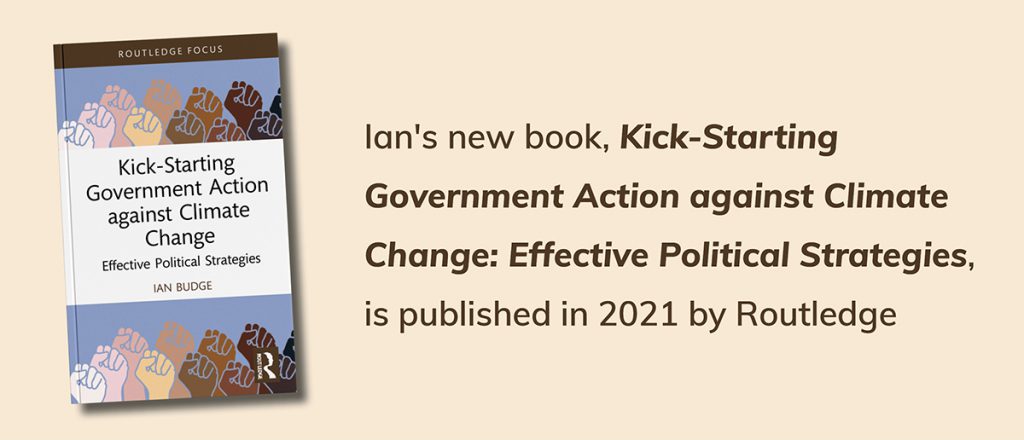COP26 revealed the difficulty of agreeing pledges on climate change. But that is nothing to the problem that now arises of acting on those pledges. Ian Budge argues that the real problem of climate change is one of collective action. Here, he proposes ways to rise to that challenge
Discussions about climate change mostly end by saying ‘We know what we want to do. All we need is to do it!’ As COP26 demonstrates, however, that is the real climate problem. If agreeing on pledges were difficult, it is nothing to the difficulty encountered in getting governments to act on them.
For, having originally ignored the evidence for climate change, most governments have now anchored themselves in a comfortable interpretation of what is going on. That is, that natural processes will still absorb most of the heat-transmitting gases in the face of human emissions, while we slowly bring these under control by 2050.
If agreeing on pledges were difficult, it is nothing to the difficulty encountered in getting governments to act on them
This comforting long-term perspective ignores the environmental reversals currently accelerating, and absolves governments from any major effort now. Aspirations for reducing emissions can be expressed and climate emergencies declared. Meanwhile, party governments get on with the really serious business of restoring national economic growth after Covid. The problems of taking environmental initiatives are compounded by having to get the agreement of around 200 governments for any concerted global action.

In the face of political inertia, what can individuals do? It is tempting to conclude they are powerless. Most folk, however, having just experienced one world crisis with Covid, want to do something to avert the next. Their problem is not knowing what will make a difference.
In a post-Covid world, most people want to do something to avert the next crisis
The current alternatives on offer – voting Green, mass demonstrations, direct action against oil extraction – have not stopped emissions over the last thirty years, nor substantially protected the environment. But there are other ways in which individuals – acting together as well as individually – can make a real difference.
A first essential is to organise mass action on a permanent basis so that potential campaigners have continuing guidance and help. A good precedent lies in the social crusades of the nineteenth century. Particularly pertinent are those organisations which committed their adherents to a written pledge to take specific steps within their own control, such as abstaining from alcohol. There is no reason why national organisations should not sign individuals up to a list of similar environmental pledges.
Another precedent are the mass boycotts of South African apartheid in the 1980s. Campaigners could now organise similar boycotts against countries burning rainforests. Investors could also check whether companies in which they hold shares are ecologically responsible. If they are not, investors can either withdraw their money or agitate for change internally.
To persuade governments to act effectively now, campaigners must organise action around issues which hit them on their key concerns: taxes and votes
Governments, however, are still the key actors. Given governments' short-term perspective, how can climate campaigners get them to act effectively now? The answer is to organise action around short-term climate-related issues which hit them on their key concerns: principally taxes and votes.
Middle class groupings – the main climate campaigners – provide most of the tax governments need to finance their activities. If they withhold payments in perfectly legal ways for activities of which they disapprove, they gain substantial political clout. Campaigners can exploit tax avoidance strategies currently open only to the rich – but only if they organise to do so. They could use these strategies to channel money from areas they disapprove of into ecological initiatives and public services. This would force governments to reconsider their main policy priorities.
However, campaigners must also get the larger public onside. But how? For many people, the next meal is their overwhelming priority. To give ordinary people the security to take a long-term view, Green parties and ecological movements must reach out. They must do so at the ideological level, but also practically, by campaigning for a minimum income guarantee for all. This would supplement an environmental New Deal and provide a necessary post-Covid economic uplift, by tackling the wider environmental errors contributing to climate change.
To name only a few; fix leaking water supply systems and stop releasing polluting sewage into rivers. Mine landfill sites for scarce materials now, and channel their methane emissions into clean energy production rather than releasing it into the atmosphere. Reforest and rewild the countryside to create jobs at all levels, especially in poorer regions where they are most needed. Undertake house insulation everywhere. All this would give climate campaigners a winning electoral message for those who cannot afford to take climate change into account as things stand.
Given their current willingness to abet climate-changing developments, and their unwillingness to regulate them – all in the name of cheap imports and fostering growth – governments must be pushed by their citizens into action. This makes democracies and their governments the key political arena for defusing heat emissions, and their actions must be of both a domestic and international nature. Democracies' extended freedoms render citizen initiatives possible, even if they have to push the political boundaries to be effective.
Rich democratic governments can also be pressured to act internationally against cheap polluting imports, and to sanction environment-destroying governments. Climate change is a problem, first and foremost, of collective action. This makes it a political problem, and therefore a problem that is not beyond resolution.